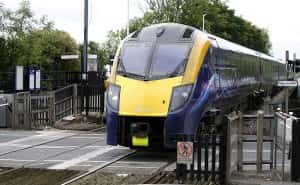
A think tank has said construction of the HS3 rail line between northern cities should take priority over the HS2 high-speed link from London to the Midlands as part of a North First strategy for transport spending.
HS3 will provide a high-speed link between Manchester and Leeds, with a projected travel time of just 30 minutes and potential extensions to Liverpool and Hull joining the West and East coasts.
Think Tank, the Institute for Public Policy Research, has written a letter calling on transport secretary Chris Grayling to shift resources from London to the North.
This is in order to close a spending gap which sees the capital get more than £1,500 per head more than other parts of England in infrastructure investment.
London’s spending of £1,869 for each inhabitant towers the North East’s £304, the North West’s £289 and the £247 per head spending in Yorkshire and Humberside.
The director of IPPR North, Ed Cox, said: “The referendum result showed that now more than ever, we need a North first approach to investment.
“To build Theresa May’s ‘better Britain’, we must focus on a better North.
“The North of England’s £300billion economy is worth more than those of Scotland, Wales and Northern Ireland combined.
“Focusing on this is going to be critical in creating the prosperity our country is going to need over the coming years.
“The North must also take control of its own funding decisions.
“The evidence shows that this would help boost growth, ditching HM Treasury’s outdated and ineffective model, better suited to mitigating congestion than driving new economic growth.”
The IPPR added that with the region’s world-class cities, ports, universities and energy assets, investment in the region’s relatively under-developed road and rail links has the potential to “unlock real and fair prosperity”, while the same money spent in London and the South-East will do little more than mitigate congestion.
IPPR analysis of Government plans for public or part-public infrastructure investment between 2016 to 2017 and 2020 to 2021 found that London is due to receive around £17bn of spending over the period – more than half of the total for England.
The Crossrail train link alone will get £4.6bn, exceeding the £4.3 billion total for all projects in the North, said the IPPR.
The letter also urged transport secretary, Mr Grayling, to take advantage of record low interest rates to raise £50n for investment in road and rail schemes for the North.
And it called for 10-year transport budgets to be devolved to Northern politicians, to allow long-term planning.
Tom Kibasi, director of IPPR London, said that the HS3 project – which got the green light in this year’s March Budget – should take precedence over HS2, which has become subject to widespread protests.
“The time it takes to travel, on hugely dated infrastructure, between our great regional cities is a national disgrace – this is just not what happens in Germany, Japan or France with their fantastic rail links, or the United States with its highly developed regional air travel,” Mr Kibasi said.
The director of IPPR London added: “Given the Brexit result, the North of England must urgently see growing prosperity. A proper east-west crossing would boost Northern and UK growth and must now take priority above all other major transport projects, including Crossrail 2 and HS2.”
Transport Secretary Chris Grayling responded and said: “As the Prime Minister has said, we will govern for the whole United Kingdom and look to build an economy that works for everyone.
“That is a top priority and the reason we have set up a new Cabinet committee to deliver on this commitment with a strong industrial strategy at its heart.
“Transport for the North are working to develop a Northern Transport Strategy and we are already making the biggest investment in transport infrastructure in generations, spending £13bn in transport across the region to improve journeys for local people, help industry grow and boost productivity.”



